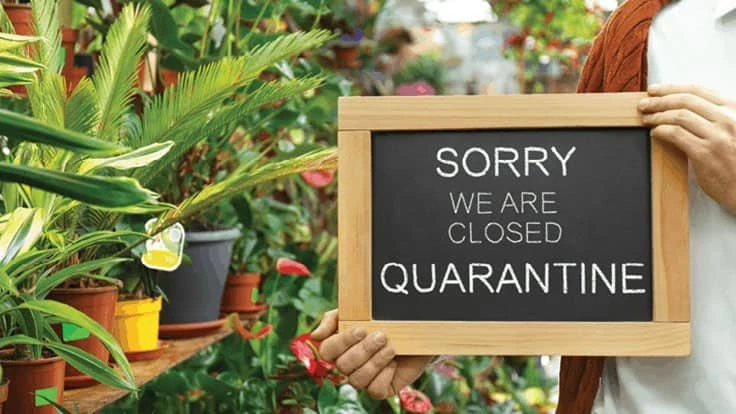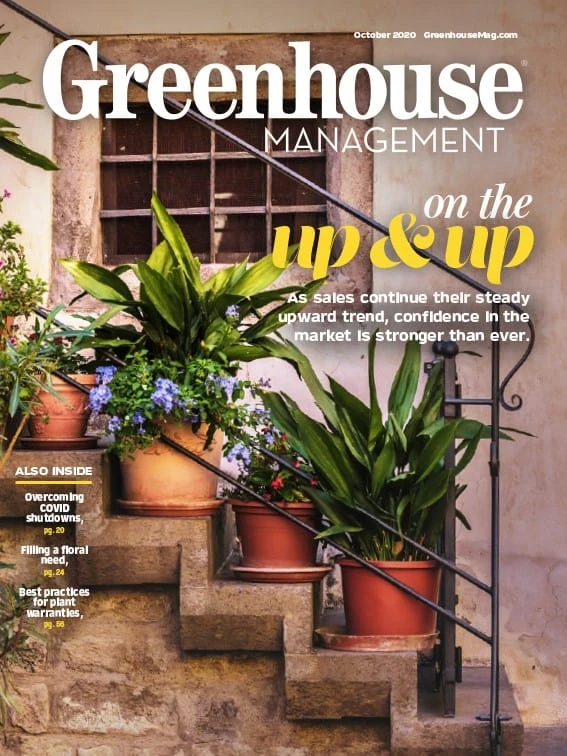

You simply cannot take the pulse of the industry this year without discussing how COVID-19 affected greenhouse and independent garden center (IGC) operations.
In most of the country, as the pandemic took hold, the large majority of horticultural businesses were deemed “essential” and permitted to continue operating, albeit with social distancing and mask mandates. In some regions, however, ornamental-producing operations were told that the crops they raise did not fall under essential business status. Those operations faced some interesting new challenges, like how to pick up a delayed production schedule and get the plants back on track for shipment after a multi-week shutdown.
And yet, as those growers soon learned, with new challenges, new opportunities tend to follow close behind.
In the Midwest, two states in particular — Michigan and Pennsylvania — imposed mandatory closures and shutdowns at the crisis’ peak.
It’s worth taking a look at how those greenhouse operations weathered the shutdown situation, just in case similar circumstances befall the industry again. Here’s how a couple of operations rolled with the punches in 2020 and emerged from the chaos, seemingly stronger than ever:

Terrific year at Telly’s
George Papadelis, president of Telly’s Greenhouse & Garden Center, very well might have been beaming so brightly other motorists caught a gleam when we reached him traversing the countryside in the family vehicle, heading on a late-summer vacation with his wife and kids.
“Like pretty much everyone else, we planted everything that was in our production schedule and it all sold,” he says, noting a 40-50% increase in year-over-year sales at Telly’s.
“We’re a $3-million greenhouse annually, and we’re up over $1 million year-to-date over last year, with four months left to go,” Papadelis says.
That is not to say 2020 was a leisurely trip down easy street for the 40-plus year-old operation. Just like others in the state, the operation faced one particularly daunting hurdle: the greenhouse was shut down for about two weeks.
“We were doing curbside and online orders at the time, and a lot of other people in our area weren’t doing it yet, and we’re selling stuff like crazy,” Papadelis says. “It was during our pansy season, and the crop is just flying out the door. So much so, we had to buy them from other growers here locally [to meet the demand].”
The result? A completely sold-out pansy crop — which is Telly’s spring specialty — and of course, a delighted management team and crew. But a visit from the local police department took a good deal of wind out of the operation’s sails.
“We were kind of taking advantage of, I guess you could call it a ‘gray area’ where we were technically essential because we were also providing vegetable transplants at the garden center,” Papadelis says. “Anyways, they come in and tell us ‘People are wondering why you are still open, and why you’re so busy?’ And then it became, ‘Well, we’re not thinking about closing you down, but maybe you should think about doing it yourself, or somebody else might [do it for you].’”
So Telly’s had to shut down. But with their highest-demand crop already completely sold out, the 14-day shutdown did not hit the businesses’ bottom line for the season too hard. Now, with all the coronavirus shutdown well in rearview, Papadelis is focused on planning what the 2021 spring season will look like.
“We will increase our production of vegetable transplants; I can definitely tell you that right now.” — George Papadelis, Telly's
“Nobody knows for sure, but I’m convinced that at least half of the people that developed new gardens and beds and plantings during the quarantine will be back for more peppers and cucumbers, and hopefully some flowers too,” he says, noting his final decision on planting and production is still pending at the moment.
“We will increase our production of vegetable transplants; I can definitely tell you that right now,” Papadelis says. “And I am thinking we will end up creating two additional plantings to add to the production schedule to kind of sneak in another late crop to meet that late-season demand that we saw in 2020.”
For the upcoming growing season, Telly’s is expecting a much smoother ride, having skillfully traversed a bumpy pandemic path already. And, of course, more of the same, at least until the pandemic fades into the rearview.
“Whether there are rules in place or not, I think a lot more people will be wearing masks in public going forward,” Papadelis says. “Maybe by next spring our customers won’t be required to wear one; I don’t know. Our employees will be wearing masks. In a hot greenhouse, to be honest we can’t stand it, but we’re doing the best that we can.”
Some of the same, some different
Over in the heart of Amish Country in Lancaster, Pennsylvania, Green Leaf Plants, a division of Aris Horticulture, experienced much of the same, with a slight twist.
“Sales were up absolutely,” says Blair Hoey, managing director. “We had a great spring and we’ve been dealing with COVID since probably the second week of February.”
Hoey does note a slight hiccup early on with some of Green Leaf’s customers cancelling orders, but says that brief road bump quickly turned to triumph when other customers, “swooped in and bought up what they needed,” essentially filling that lost demand, on-demand.
The hairpin turn in Green Leaf’s windy COVID road was just ahead, however.
“We ended up having to voluntarily close down for a week due to multiple employees testing positive [for COVID],” Hoey says. “Unfortunately, we came to find out that it was brought into the organization by those employees from outside activities away from work.”
“And we discovered all of that over the weekend, just prior to that week we had to close,” he says. “It was the end of April — production week 18 for us — and we had to cancel all incoming and outgoing shipments. It was quite the task, as you can probably imagine.”
“We had PPE in here as early as the end of February ... and I think that early action paid dividends.” — Blair Hoey, Green Leaf Plants
Green Leaf quickly mobilized resources, bringing on a specialized cleaning crew the first Monday it was shut down, and by Thursday, Hoey estimates they had about 25% of the organization back on site. By the following Monday, exactly one week later, they were back to full staffing levels, though they allowed most of the office and administrative staff to continue working remotely. Those workers, too, have since returned to the site.
“We actually had additional people in hand [on that Monday], so we were able to get caught up by the end of the week, and we got both week 18 and week 19 material planted. So we were still able to start week 20 plantings on week 20, which was great,” he says.
Situated in a region heavily trafficked by New York and Philadelphia metropolitan area residents scratching their agritourism itch, everyone on the Green Leaf team from top to bottom has gotten a crash course in PPE and social distancing over the last few months.
“We had PPE in here as early as the end of February, and we’ve since implemented social distancing on the work lines, all kinds of additional sanitation work throughout the facility, and I think that early action paid dividends,” Hoey says.
Now, a repurposed cold fogger is deployed Monday through Friday to spray cleaning products throughout the facility. It is all part of the company’s new normal. And that new normal increases operational expenses.
“Colleagues in Europe that I know are being assessed COVID sanitation fees from some of their vendors, and to be honest we’ve expected to run into some of that with our vendors, but so far we’ve been lucky,” he says.
And while Hoey says it’s hard to put a hard number on the cost, he guesses the company has spent more than $20,000 this year on PPE, cleaning equipment, time and having the facility scrubbed.
Hoey admits he is not sure what to expect as far as COVID is concerned for the upcoming spring season, but the team at Green Leaf sounds open to getting creative.
“Right now, we’re playing our cards as if it will be more of the same [next year],” he says. “Schools are just opening here and we’re currently dealing with that, and how that effects mom and dad. We’re looking into having some employees being able to bring their kids to work, and we can put them in a separate facility with internet and their own tablets, and all kinds of things for them to do …
“That’s much better option, in my opinion, than having people work from home forever.”

Explore the October 2020 Issue
Check out more from this issue and find your next story to read.
Latest from Greenhouse Management
- Anthura acquires Bromelia assets from Corn. Bak in Netherlands
- Top 10 stories for National Poinsettia Day
- Langendoen Mechanical hosts open house to showcase new greenhouse build
- Conor Foy joins EHR's national sales team
- Pantone announces its 2026 Color of the Year
- Syngenta granted federal registration for Trefinti nematicide/fungicide in ornamental market
- A legacy of influence
- HILA 2025 video highlights: John Gaydos of Proven Winners





